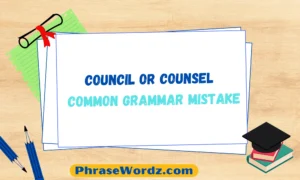English grammar can sometimes be tricky, even for native speakers. One of the most common mistakes revolves around the words “there” and “their.” These homophones (words that sound the same but have different meanings) are often misused, leading to confusion in both writing and speech.
Confused about “There or Their”? Our guide breaks down their meanings, usage, and key differences with engaging examples to help you avoid errors and improve your English communication skills!
This article explores the definitions, correct usage, and practical applications of these two words, providing examples, scenarios, and tips to help you avoid common pitfalls.
What Does “There” Mean?
The word “there” is a versatile term in English. It can serve as:
- An adverb, indicating a place or position.
- Example: “The book is over there on the shelf.”
- A pronoun, used to introduce a sentence or clause.
- Example: “There is a chance we might win the competition.”
- An interjection, expressing focus or relief.
- Example: “There, it’s done!”
What Does “Their” Mean?
The word “their” is a possessive pronoun. It indicates ownership or association, referring to something that belongs to “them.”
- Example: “The children forgot their jackets at school.”
Unlike “there,” “their” always relates to possession and is not used to describe locations or states.
Why Do People Confuse Them?
- Homophones: Both words sound identical, making it easy to confuse them in spoken language and consequently in writing.
- Quick Typing Errors: When writing quickly, it’s common to type the wrong one without realizing it.
- Lack of Grammar Awareness: Many learners and even native speakers overlook the distinct meanings and functions of these words.
Scenarios to Illustrate Differences
Scenario 1: Planning a Trip
Incorrect Usage: “We’ll meet at their for the group photo.”
Correct Usage: “We’ll meet at there for the group photo.”
Explanation: In this sentence, “there” refers to a location. Using “their” would incorrectly imply possession.
Scenario 2: Discussing Ownership
Incorrect Usage: “The students have left there books in the classroom.”
Correct Usage: “The students have left their books in the classroom.”
Explanation: In this case, “their” indicates possession, referring to the books that belong to the students.
Practical Examples in Emails
Example 1: Event Invitation
Subject: Meeting Location and Details
Dear Team,
I hope this email finds you well. The next meeting will be held at the community center. Once everyone is there, we will distribute the agenda for discussion. Please ensure that everyone brings their assigned materials to share during the presentation.
Looking forward to your participation.
Best regards,
Sarah Harper
Example 2: Lost Property Inquiry
Subject: Lost and Found Inquiry
Dear Mr. Johnson,
I recently attended a workshop at your venue. It seems that someone left their belongings in the meeting room. Could you confirm if the items are still there so I can arrange to collect them?
Thank you for your assistance.
Best regards,
Emily Carter
Common Tips to Avoid Confusion
- Focus on Context:
- Ask yourself: Does the sentence refer to a location (there) or possession (their)?
- Example: “Is the focus on where or whose?”
- Create Mental Associations:
- Think of “there” as related to “where.”
- Think of “their” as related to “her” or “his,” as they all indicate possession.
- Proofread Your Work:
- Reread sentences to ensure you’ve used the right word. Tools like grammar checkers can also help.
- Practice with Examples:
- Write your own sentences using both words to strengthen your understanding.
Describe Difference Between There or Their
The difference between “there” and “their” lies in their function:
- “There” refers to a location, existence, or focus in a sentence.
- “Their” is a possessive pronoun indicating ownership.
By paying attention to these distinctions, you can ensure precise and effective communication.
Conclusion
Mastering the difference between “there” and “their” is a simple yet essential skill for clear and professional writing.
Whether you’re drafting an email, preparing a report, or casually texting, using the correct word ensures your message is both accurate and polished. Through practice and awareness, this common grammar mistake can easily be avoided.











